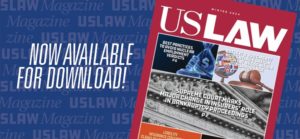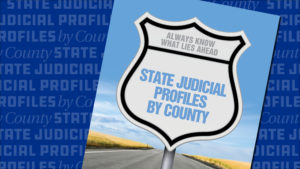Immersion Legal Jury LLC, a nationally based jury consulting firm, has been named the official jury consulting… Continue Reading
New Jersey Interpretation of Uniform Statute May Be Coming to a State Near You
POSTED AUGUST 29, 2016
A special to USLAW NETWORK and USLAW DigiKnow
By Noel D Humphreys, Connell Foley LLP, Roseland, New Jersey
Limited liability companies across the country may be surprised to learn that a recent ruling in New Jersey could impact their business. In early August 2016, New Jersey’s Supreme Court ruled on application of the “not reasonably practicable” language of the Revised Uniform Limited Liability Company Act (RULLCA). Specifically, the court examined the phrasing as adopted in New Jersey in the context of a court-ordered expulsion of a company member who was not getting along with the other members. However, since approximately 15 states (including California, Illinois and Florida) and the District of Columbia have adopted the act, this decision may have national implications.
RULLCA permits a company to seek a court order to “dissociate” a member that engages in “conduct relating to the company’s activities which makes it not reasonably practicable to carry on the activities with the person as a member.” RULLCA uses the “not reasonably practicable” test in both the situation where a company wants to expel a member (Section 602(5)(C)) and in the situation where a member wants to dissolve an LLC (Section 701(a)(4)(B)).
In the New Jersey case discussed here, three men had been together in a business that went bankrupt. Two of the men started a successor business, and the third one, Carroll, joined after a while. Carroll had lost a substantial amount of money in the earlier business and wanted the successor business to compensate him for his losses. The other two members would not agree to Carroll’s demands.
The company brought an action to dissociate Carroll as a member on the grounds that, due to Carroll’s clamoring for money, it was “not reasonably practicable” to carry on the company’s activities any longer with Carroll as a member.
The trial court granted the requested order, and the appellate court upheld the trial court. The New Jersey Supreme Court reversed and remanded. The court stated that the company had to provide substantial evidence that Carroll’s behavior had adversely affected the company to such an extent that “it must be unfeasible, despite reasonable efforts, to keep the LLC operating while the disputed member remains affiliated.” The court described this as a “stringent” standard and a “high bar.”
The court adopted a seven-factor test for courts to use in assessing whether the company had met its burden of satisfying the “not reasonably practicable” standard. The court assessed the evidence in this case and found the company had not provided adequate evidence that Carroll’s behavior had had enough adverse impact on the company to meet the test.
The New Jersey Supreme Court drew its seven-factor assessment from a Colorado decision (Gagne v. Gagne, 338 P.3d 1152 (Colo. App. 2014), which had considered the test in the context of a member seeking a court-ordered dissolution. The interplay between these two decisions suggests that courts are likely to view the showing required under a “not reasonably practicable” test as the same in both expulsion and dissolution circumstances.
Although the New Jersey case arose under the prior version of the uniform act, RULLCA barely changed the prior language. The decision states that the standards under the prior act and under the current act are “identical.”
Businesses organized in states that have adopted RULLCA should keep this interpretation in mind when drafting an operating agreement. Careful planning could help avoid time-consuming, disruptive and costly disputes at many phases of a limited liability company’s life.
RULLCA’s text can be found at: http://www.uniformlaws.org/shared/docs/limited%20liability%20company/ullca_final_06rev.pdf
The New Jersey Supreme Court’s unanimous decision may be found at IE Test, LLC v Carroll, 2016 BL 249284, 2016 WL 4086260 (NJ Sup Ct Aug. 2, 2016).
About the Author
Noel D. Humphreys is of counsel in the Corporate and Business Law Group at Connell Foley LLP in Roseland, NJ and New York, NY. He regularly advises clients on corporate transactions, lending transactions, organizational governance and intellectual property, as well as the settlement of business disputes.










